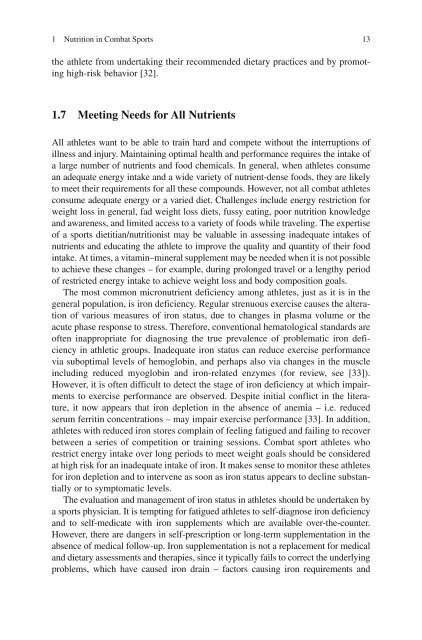Nutrition in Combat Sports
Nutrition in Combat Sports
Nutrition in Combat Sports
You also want an ePaper? Increase the reach of your titles
YUMPU automatically turns print PDFs into web optimized ePapers that Google loves.
1 <strong>Nutrition</strong> <strong>in</strong> <strong>Combat</strong> <strong>Sports</strong> 13<br />
the athlete from undertak<strong>in</strong>g their recommended dietary practices and by promot<strong>in</strong>g<br />
high-risk behavior [32] .<br />
1.7 Meet<strong>in</strong>g Needs for All Nutrients<br />
All athletes want to be able to tra<strong>in</strong> hard and compete without the <strong>in</strong>terruptions of<br />
illness and <strong>in</strong>jury. Ma<strong>in</strong>ta<strong>in</strong><strong>in</strong>g optimal health and performance requires the <strong>in</strong>take of<br />
a large number of nutrients and food chemicals. In general, when athletes consume<br />
an adequate energy <strong>in</strong>take and a wide variety of nutrient-dense foods, they are likely<br />
to meet their requirements for all these compounds. However, not all combat athletes<br />
consume adequate energy or a varied diet. Challenges <strong>in</strong>clude energy restriction for<br />
weight loss <strong>in</strong> general, fad weight loss diets, fussy eat<strong>in</strong>g, poor nutrition knowledge<br />
and awareness, and limited access to a variety of foods while travel<strong>in</strong>g. The expertise<br />
of a sports dietitian/nutritionist may be valuable <strong>in</strong> assess<strong>in</strong>g <strong>in</strong>adequate <strong>in</strong>takes of<br />
nutrients and educat<strong>in</strong>g the athlete to improve the quality and quantity of their food<br />
<strong>in</strong>take. At times, a vitam<strong>in</strong>–m<strong>in</strong>eral supplement may be needed when it is not possible<br />
to achieve these changes – for example, dur<strong>in</strong>g prolonged travel or a lengthy period<br />
of restricted energy <strong>in</strong>take to achieve weight loss and body composition goals.<br />
The most common micronutrient deficiency among athletes, just as it is <strong>in</strong> the<br />
general population, is iron deficiency. Regular strenuous exercise causes the alteration<br />
of various measures of iron status, due to changes <strong>in</strong> plasma volume or the<br />
acute phase response to stress. Therefore, conventional hematological standards are<br />
often <strong>in</strong>appropriate for diagnos<strong>in</strong>g the true prevalence of problematic iron deficiency<br />
<strong>in</strong> athletic groups. Inadequate iron status can reduce exercise performance<br />
via suboptimal levels of hemoglob<strong>in</strong>, and perhaps also via changes <strong>in</strong> the muscle<br />
<strong>in</strong>clud<strong>in</strong>g reduced myoglob<strong>in</strong> and iron-related enzymes (for review, see [33]).<br />
However, it is often difficult to detect the stage of iron deficiency at which impairments<br />
to exercise performance are observed. Despite <strong>in</strong>itial conflict <strong>in</strong> the literature,<br />
it now appears that iron depletion <strong>in</strong> the absence of anemia – i.e. reduced<br />
serum ferrit<strong>in</strong> concentrations – may impair exercise performance [33] . In addition,<br />
athletes with reduced iron stores compla<strong>in</strong> of feel<strong>in</strong>g fatigued and fail<strong>in</strong>g to recover<br />
between a series of competition or tra<strong>in</strong><strong>in</strong>g sessions. <strong>Combat</strong> sport athletes who<br />
restrict energy <strong>in</strong>take over long periods to meet weight goals should be considered<br />
at high risk for an <strong>in</strong>adequate <strong>in</strong>take of iron. It makes sense to monitor these athletes<br />
for iron depletion and to <strong>in</strong>tervene as soon as iron status appears to decl<strong>in</strong>e substantially<br />
or to symptomatic levels.<br />
The evaluation and management of iron status <strong>in</strong> athletes should be undertaken by<br />
a sports physician. It is tempt<strong>in</strong>g for fatigued athletes to self-diagnose iron deficiency<br />
and to self-medicate with iron supplements which are available over-the-counter.<br />
However, there are dangers <strong>in</strong> self-prescription or long-term supplementation <strong>in</strong> the<br />
absence of medical follow-up. Iron supplementation is not a replacement for medical<br />
and dietary assessments and therapies, s<strong>in</strong>ce it typically fails to correct the underly<strong>in</strong>g<br />
problems, which have caused iron dra<strong>in</strong> – factors caus<strong>in</strong>g iron requirements and

















